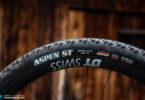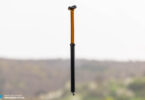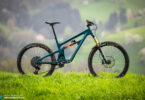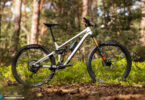First Look | Alchemy Arktos Trailbike
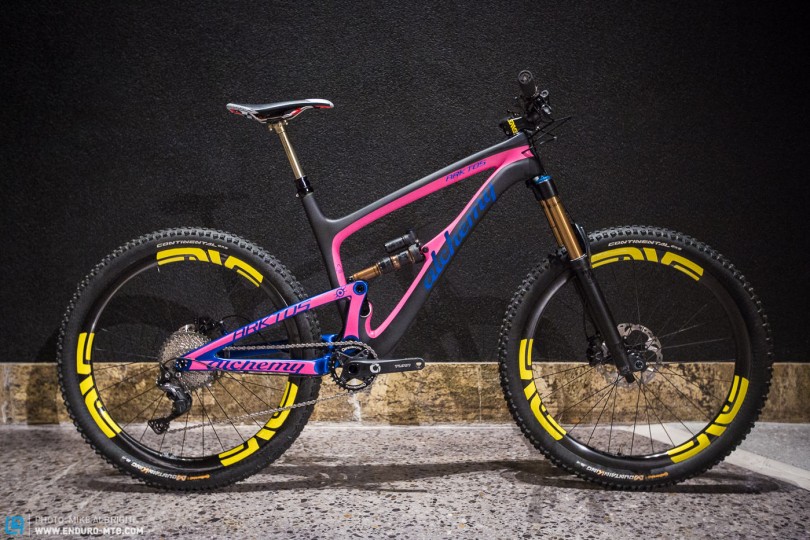
Aiming high: Interbike 2015 paved the way for ALCHEMY to present their very first full-suspension bike in the form of the Arktos. Appearing from the out-set in full carbon with no aluminium precursor, this 150 mm trail bike is hand-made in the USA by the prestigious Denver-based custom bike manufacturing company. A daring endeavor, but with the support of suspension guru Dave Earle when it comes to the frame design, it’s certainly an interesting collaboration that’s caught our eye.
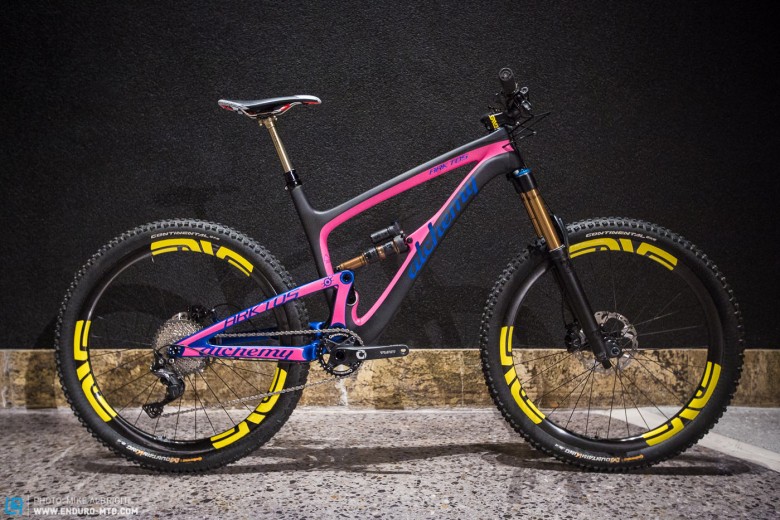
What a looker: the Arktos 150mm trail bike is the latest project by the American carbon bike manufacturing company ALCHEMY.
The 10-strong team from Denver, Colorado, haven’t got the biggest stand at Interbike 2015, and nor do they scream and shout about their wares. While their stand might be understated compared to some, the vibes are incredibly friendly and ALCHEMY are clearly stoked to present their latest project: the super well-specced Arktos in full carbon with a pink and blue colourway. With its futuristic-looking, organic frame design, this 27.5″ trail bike with 150 mm travel is a definite looker and more than equipped for the future with internally routed cables, no irritating mount for the front derailleur and the Boost 148 mm standard. Channeling a tidy image, the Arktos’s modern design is impressive.
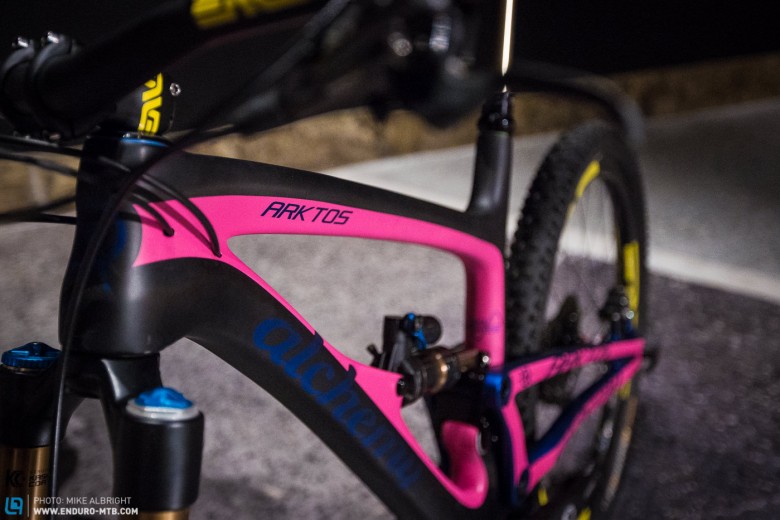
Internally routed cables for the gears, brakes and dropper post are a winning design feature, giving the Arktos a clean look.
After years creating custom carbon road bikes, the Americans’ aptitude for carbon fiber is unquestionable, and the many prizes for their sinfully expensive bikes are testament to this. But full-suspension trail bikes couldn’t be much further from a featherweight asphalt arrow; clever rear end designs and optimal riding behaviour on the trails are not characteristics that fall from the sky. When it comes to the geometry, ALCHEMY haven’t strayed too far from the norm, opting to give the size large frame a 66.5º head angle, a 73.5º seat angle and chainstays of 438 mm. Similarly, at 431 mm, the reach errs on the more conservative side of things.
| Size | Small | Medium | Large | X-Large |
|---|---|---|---|---|
| Seat Tube | 429mm | 455mm | 483mm | 518mm |
| Effective Top Tube | 585mm | 600mm | 615mm | 635mm |
| Head Tube Length | 100mm | 110mm | 115mm | 130mm |
| Head Tube Angle | 66,0° | 66,5° | 66,5° | 67,0° |
| Stack | 589mm | 599mm | 604mm | 614mm |
| Reach | 401mm | 415mm | 431mm | 448mm |
| Seat Tube Angle | 73,5° | 73,5° | 73,5° | 73,5° |
| Chain Stay Length | 430mm | 438mm | 438mm | 438mm |
| Estimated BB Hight | 346mm | 346mm | 346mm | 346mm |
| BB Drop | 10mm | 10mm | 10mm | 10mm |
Once you’ve taken a closer look at the head angle, you’ll notice that it gets steeper as the frame size goes up. While the smallest frame (the S) is 66º, the XL model delivers an angle of 67º. An unusual logic perhaps, but the steeper head angle is intended to improve climbing performance as the reach increases. The idea comes courtesy of the incredibly successful engineer Dave Earle, who has previously won tons of awards for distinctive frame designs, and played a role in the design and production of ALCHEMY’s newest dream in carbon. And with such a mastermind involved in the Arktos, it’s hard to have any doubt as to how the road brand will fare with their new fully.
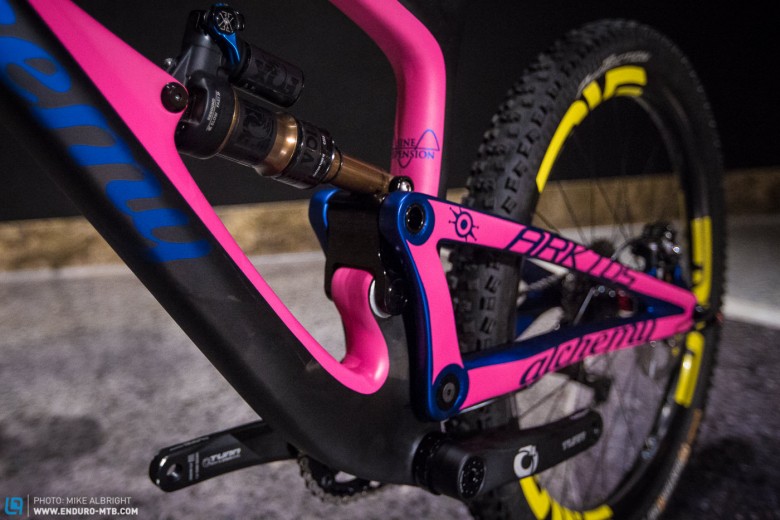
The ALCHEMY Arktos’s rear end design is based around two short pivots, which essentially work in a similar manner to VPP rear suspension.
It won’t be surprising if you draw parallels to YETI’s Switch Infinity Technology, a variation of the tried and tested Virtual Pivot Point (VPP) rear suspension and one of Earle’s trademarks. For the Arktos, ALCHEMY licensed Earle’s dual short-stay platform, cashing in on the rear end’s pedal efficiency and braking prowess.
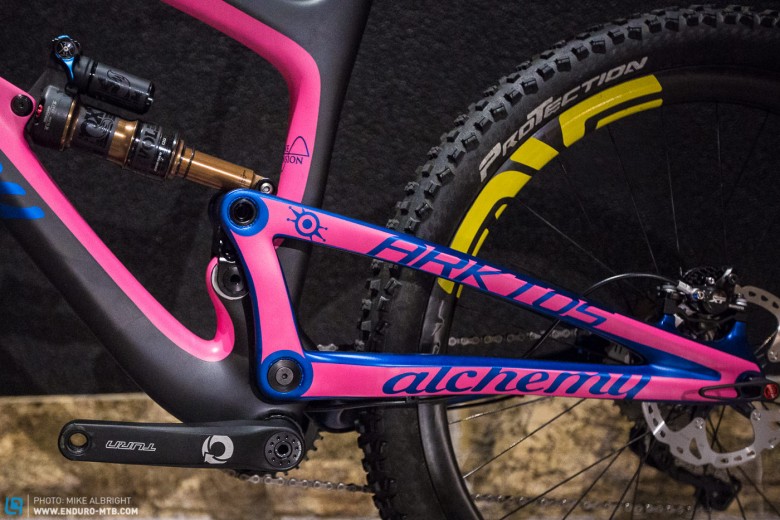
The second short rocker arm is fully hidden in the frame above the bottom bracket.
According to ALCHEMY, the Arktos behaves not like it has a conventional VPP suspension setup. The Arktos’s spring curve is reminiscent of sine wave, and ALCHEMY consequently dubbed it Sine Suspension. The frame design is intended to give a regressive curve in the first negative third of travel, before ramping up progressively and then returning to a regressive curve to reduce the risk of bottoming-out. As a result, the shock is softer and more responsive, much like a negative spring chamber. Small bump sensitivity is amplified and more traction is provided compared to a rear suspension design with a progressive or linear curve.
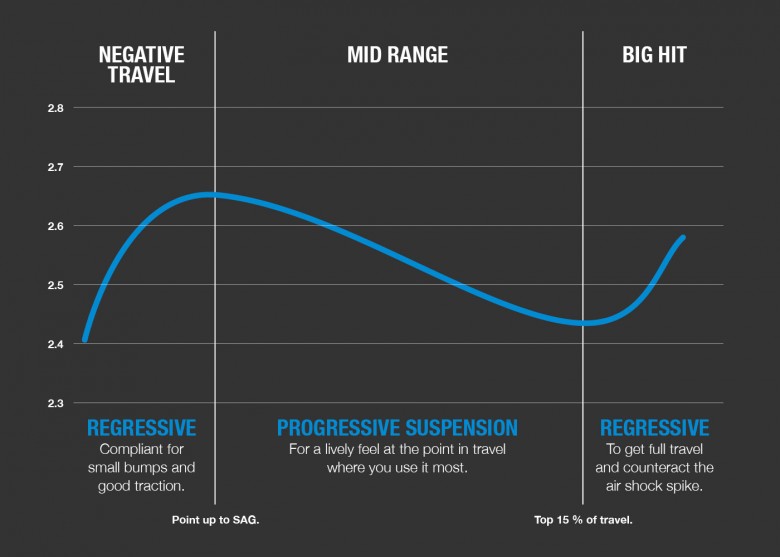
The Arktos’s spring curve is certainly not standard.
In the mid-stroke travel, the Sine suspension sees the spring curve of the Arktos change once more, turning nicely progressive, which is ideal for keeping stable sag and preventing the travel from being eaten up on quick bends or berms. After around 85% travel, the Sine turns regressive once more, giving all of the travel up for grabs and countering the heavily-progressive dampening from the air shock. This essentially should rule out bottoming-out, no matter how aggressively you’re riding or how big the hits are. We’re definitely excited to see how this concept holds up when put to the test.
The Arktos sees ALCHEMY positioning themselves in the premier league of full suspension players, an objective that’s evident not just in the efficient rear end and high-end spec; the frame kit alone with a standard finish and a Fox Float X rear shock retails at $3,750. As of 2016, more complete models will be available and clients will have the opportunity to upgrade and choose from a wider colour palette. Given its super cool look and irrefutably good genetics, the Arktos is sure to find some admirers.
For more info on ALCHEMY head to: http://www.alchemybicycles.com
Words: Steffen Gronegger Photos: Mike Albright, ALCHEMY PR
Did you enjoy this article? If so, we would be stoked if you decide to support us with a monthly contribution. By becoming a supporter of ENDURO, you will help secure a sustainable future for high-quality mountain bike journalism. Click here to learn more.



